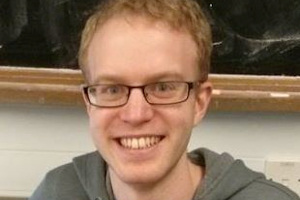Manchester mathematician wins national research competition at House of Commons
08 Mar 2016
Dr Philip Pearce, a Research Fellow in the School of Mathematics, has won first prize at the ‘SET for Britain’ competition in the House of Commons

Philip, who originally hails from Gnosall in Staffordshire, won the gold award and a £3000 prize, after his research on using mathematics to build a virtual placenta was judged against hundreds of other scientists’ research in the only national competition of its kind.
SET for Britain is a poster competition which aims to encourage, support and promote Britain's early-stage and early-career research scientists, engineers, technologists and mathematicians, who are an essential part of continuing development of research and development in the UK. The awards are given on the basis of the very best research work, together with the ability of the researcher to communicate their work to a lay audience.
Philip’s research aims to eventually build a working virtual placenta, which could be used for the early identification and prevention of diseases during pregnancy. He indicates that this is just one of the many ways in which mathematics can be useful in medical applications.
“I think it's really important that the benefits of mathematical research are communicated to the general public,” said Dr Pearce. “SET for Britain is an excellent opportunity for Members of Parliament to learn about some of the cutting-edge mathematics being done in the UK.”
Stephen Metcalfe MP, Chairman of the Parliamentary and Scientific Committee, said: “This annual competition is an important date in the parliamentary calendar, because it gives MPs an opportunity to speak to a wide range of the country’s best young researchers. These early career engineers, mathematicians and scientists are the architects of our future, and SET for Britain is politicians’ best opportunity to meet them and understand their work”.
Sir Adrian Smith, Chair of the Council for the Mathematical Sciences (CMS), said: “The CMS is delighted, once again, to showcase the importance of the mathematical sciences to a wider audience. It is paramount to encourage early-career research scientists, engineers, technologists and mathematicians, and the SET for Britain event is a very effective way of doing this.”
